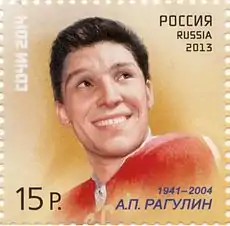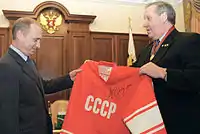| Alexander Ragulin | |||
|---|---|---|---|
 Alexander Ragulin on a 2013 Russian stamp from the series "Sports Legends" | |||
| Born |
5 May 1941 Moscow, Russian SFSR, Soviet Union | ||
| Died |
17 November 2004 (aged 63) Moscow, Russia | ||
| Height | 6 ft 1 in (185 cm) | ||
| Weight | 231 lb (105 kg; 16 st 7 lb) | ||
| Played for |
CSKA Moscow Khimik Voskresensk | ||
| National team |
| ||
 Ragulin presents his signed uniform to President Vladimir Putin in 2001 | ||
| Medal record | ||
|---|---|---|
| Representing | ||
| Olympic Games | ||
| 1964 Innsbruck | ||
| 1968 Grenoble | ||
| 1972 Sapporo | ||
| World Championships | ||
| 1961 Geneva | ||
| 1963 Stockholm | ||
| 1964 Innsbruck | ||
| 1965 Tampere | ||
| 1966 Ljubljana | ||
| 1967 Vienna | ||
| 1968 Grenoble | ||
| 1969 Stockholm | ||
| 1970 Stockholm | ||
| 1971 Bern | ||
| 1972 Prague | ||
| 1973 Moscow | ||
Alexander Pavlovich "Rags" Ragulin (Russian: Александр Павлович Рагулин; 5 May 1941 – 17 November 2004) was a Russian ice hockey player. He is considered one of the best defensemen in Soviet ice hockey history, winning three Olympic gold medals and ten world titles. He was inducted to the IIHF Hall of Fame in 1997, and in 2001 received the Olympic Order in Silver.
Playing career
Ragulin began training in ice hockey in 1957 with Khimik Voskresensk, where he played with his brothers Anatoly and Mikhail.[1] In 1962 he moved to powerhouse CSKA Moscow and played with that team until retiring in 1973. With CSKA he won nine Soviet titles (1963–66, 1968, 1970–73) and five European Champions Cups (1969–73). During his 13 years with the Soviet national team, Ragulin played 239 matches and scored 29 goals. Besides the Olympic and world titles, he won nine gold (1963–70 and 1973) and three silver medals (1961, 1971, 1972) at the European Championships, and was selected as the best defenseman of the 1966 World Championships. In 1972, he played six out of eight games of the Summit Series between Canada and the Soviet Union. After retiring from competitions, Ragulin coached SKA Novosibirsk and worked with children at the CSKA Moscow sports school.[2] He was inducted to the IIHF Hall of Fame in 1997, and in 2001 received the Olympic Order in Silver.[3]
References
- ↑ Martin 1990, p. 77
- ↑ Evans, Hilary; Gjerde, Arild; Heijmans, Jeroen; Mallon, Bill; et al. "Alexander Ragulin". Olympics at Sports-Reference.com. Sports Reference LLC. Archived from the original on 18 April 2020.
- ↑ Bektemirov, Farid (16 June 2011). "Во славу ИИХФ. Часть 14. Александр Рагулин". Championat (in Russian). Moscow, Russia. Retrieved 4 July 2023.
Bibliography
- Martin, Lawrence (1990), The Red Machine: The Soviet Quest to Dominate Canada's Game, Toronto: Doubleday Canada, ISBN 0-385-25272-2
External links
- Biographical information and career statistics from Eliteprospects.com, or Eurohockey.com, or The Internet Hockey Database
- IIHF Hall of Fame profile on Ragulin
- Ragulin at Hockey CCCP International
- The Summit in 1972 profile on Ragulin
- (in Russian) Alexander Ragulin's profile in the Modern Museum of Sports features a lot of photos of him, his awards and decorations